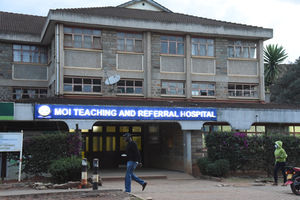CSOs, experts decry slow progress on Africa's key demands at COP28

From left: Dr Philip Osano, Stockholm Environment Institute Centre Director of Africa, former 800m Olympic champion David Rudisha and Ms Susan Mbae of Global Climate Action field questions from ‘Nation’ journalist Hellen Shikanda at COP28 in Dubai on Friday.
A caucus of civil societies attending the 28th Conference of Parties (COP28) is dejected by the slow progress of the COP process as the end of the summit draws near.
Monday is the set end date of COP28, but in some cases, like in Egypt last year, an extension is made when parties fail to agree on the outcome of the text.
There are different issues on the agenda of the climate summit, with different blocs coming with their negotiators to push their needs.
Based on the Nairobi Declaration and the interests of the people of the African continent, some of the issues that civil society groups hoped to be on the fore are financing adaptation and a shift to renewable energy.
In a joint press briefing organised by 350.org, Power Shift Africa, and ACCESS Coalition, their representatives implore negotiators to back an outcome that will yield a fast, fair, and fully-funded transition from fossil fuels.
On the other hand, experts say that the Global Goal on Adaptation continues to be dragged down even as evidence from the United Nations Environment Program (UNEP)'s Adaptation Gap Report shows that climate adaptation is lagging.
A contentious debate on fossil fuels phase-out versus its phase-down continues to rock the climate negotiations. At the moment, Africa’s energy mix shows that fossil fuels such as coal, oil, and gas take up more than 70 percent of our usage in different sectors.
The International Energy Agency (IEA) warns that if the policies that are currently in place keep being used, the world will warm to levels that will surpass the one set under the Paris Agreement.
“With today’s policies, the global average temperature rise is likely to hit 2 degrees Celsius around 2050, but this would probably result in a median temperature rise of 2.7 degrees Celsius in North Africa. That would reduce African GDP by around 8 per cent in 2050 relative to a baseline without any climate impacts. Losses in some regions such as East Africa would reach around 15 per cent,” shows an IEA analysis last year.
Speaking on the sidelines of COP28, the three CSOs warned that the current fossil fuel-based energy system in Africa has failed to deliver energy access to the continent while leaving more than half a billion Africans energy-poor.
“The two percent (about $60 billion) investment received by the continent in the last decade for renewable energy development is unfair, unjust, and unacceptable,” they said.
They now demand that renewable energy usage be scaled up to more than 15,000 GW by 2030 or an average of 1500 GW every year to ensure the 1.5 degrees Celsius temperature target is not surpassed.
“This COP is not the place to protect countries’ selfish interests. Taking such a position would be absurd. This COP should be a place to forge collaborations that allow all countries to phase out fossil fuels. It is time for everyone at this COP to call out the energy system that is responsible for the climate crisis the world is currently experiencing,” said Amos Wemanya Lead, Just Transitions, Power Shift Africa.
"There is nothing like abated or unabated fossil fuels. We know the source of the climate crisis. We must address emissions from the source. We must also phase out subsidies and other financial support for fossil fuels. It is also important to cease using convenient language such as efficient or inefficient energy forms,” he added.
Unabated fossil fuels refer to the dirty fuels that are linked to global warming, abated, on the other hand, use technologies to reduce emissions but proponents argue that these technologies have not been proven.
Delving into the abated versus unabated debate, the Health caucus in the climate conference says that a phase-out is ideal, rather than using technologies that have not been proven.
Dr Jeni Miller, Executive Director of the Global Climate and Health Alliance and one of the Climate and Health envoys for COP28 said in a statement on Sunday that the difference for people’s health of phasing out only ‘unabated’ fossil fuels, versus a full fossil fuel phase-out, is night and day.
“Coal, oil and gas are responsible for significant health harms at every stage, from extraction, through processing and transport, to when they are burned,” she said.
“Important questions remain about whether carbon capture and storage (CCS) can work at scale. But even setting that aside, CCS, and similarly, focusing on reducing emissions rather than the fossil fuel sources of emissions, does nothing about the many other pollutants produced when fossil fuels are burned, and that is devastating to human health,” she added.
Florence Gichoya, representing the ACCESS coalition said that a just transition for energy in Africa should focus on Africans’ needs because every decision we make at this COP will affect us not just now but for generations to come. What we decide today will be stuck with us forever.
Their sentiments were echoed by the hundreds of protestors who peacefully marched within the precincts of the Blue Zone area at Dubai’s Expo City –all calling for fossil fuel phase-out.
Speaking at a media huddle on Sunday, Cristina Rumbaitis, Senior Policy Advisor for the UN Foundation said that the Global Goal on Adaptation is the most important outcome for this year's COP, only that at the moment, the language in negotiation rooms is weak and that will be a setback for developing countries.
"We need this framework with clear targets and financing behind it, to be a guiding star for adaptation in the world, but most importantly, for the Global South. This framework is necessary to send a clear message to politicians and decision-makers at all levels that urgent action is needed.





